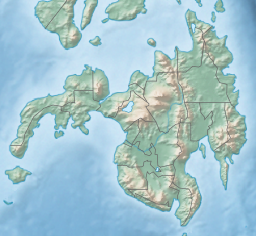Davao Gulf
| Davao Gulf | |
|---|---|
 BRP Capones and BRP Tubbataha traversing Davao Gulf | |
| Location | Mindanao Island |
| Coordinates | 6°30′00″N 125°58′35″E / 6.5000°N 125.9763°E |
| Type | Gulf |
| Etymology | Davao |
| Settlements | |
Davao Gulf is a gulf situated in the southeastern portion of Mindanao in the Philippines.[1] It has an area of 5,200 km2 (2,000 sq mi) or about 520,000 hectares.[2] Davao Gulf cuts into the island of Mindanao from the Philippine Sea.[3] It is surrounded by all five provinces in the Davao Region.[4] The largest island in the gulf is Samal Island. Davao City, on the Gulf's west coast, is the largest and busiest port on the gulf.[5] The Bagobo and the Kaagan / Kalagan, who are the indigenous Lumad tribes endemic to Davao, are known inhabitants of the said gulf.[6]
Wildlife
[edit]The gulf water is regarded as one of the most diverse cetacean habitats in the nation, being home to at least 10 species of toothed whales and dolphins such as sperm whales and beaked whales.[7] Also, whale sharks and sea cows are seen frequently.[8][9] Furthermore, several ecological phenomena have been observed in Davao Gulf such as a previously unknown predator of the crown-of-thorns starfish, new species records, and new species discoveries underlining the uniqueness of the marine resources in Davao Gulf.[10][11][12][13]

References
[edit]- ^ "Saving Mermaids in the Davao Gulf". wwf.panda.org. Retrieved January 1, 2021.
- ^ Lacorte, Germelina. "Davao chamber hosts concert to save sea turtles". Philippine Daily Inquirer. Archived from the original on August 22, 2010. Retrieved August 20, 2010.
- ^ "Protecting the Davao Gulf". Retrieved January 1, 2021.
- ^ "Protecting the Davao Gulf". Retrieved January 1, 2021.
- ^ "Saving Mermaids in the Davao Gulf". wwf.panda.org. Retrieved January 1, 2021.
- ^ "Saving Mermaids in the Davao Gulf". wwf.panda.org. Retrieved January 1, 2021.
- ^ "Davao Gulf, PH". iNaturalist. Retrieved January 1, 2021.
- ^ "Davao Gulf, PH". iNaturalist. Retrieved January 1, 2021.
- ^ "eyot in the Davao Gulf". wwf.panda.org. Retrieved January 1, 2021.
- ^ Bos A.R.; G.S. Gumanao; F.N. Salac (2008). "A newly discovered predator of the crown-of-thorns starfish". Coral Reefs. 27 (3): 581. Bibcode:2008CorRe..27..581B. doi:10.1007/s00338-008-0364-9. S2CID 34920961.
- ^ Ocaña O.; J.C. den Hartog; A. Brito; A.R. Bos (2010). "On Pseudocorynactis species and another related genus from the Indo-Pacific (Anthozoa: Corallimorphidae)". Revista de la Academia Canaria de Ciencias. XXI (3–4): 9–34.
- ^ Bos A.R.; H.M. Smits (2013). "First Record of the dottyback Manonichthys alleni (Teleostei: Perciformes: Pseudochromidae) from the Philippines". Marine Biodiversity Records. 6: e61. Bibcode:2013MBdR....6E..61B. doi:10.1017/s1755267213000365 (inactive December 22, 2024).
{{cite journal}}: CS1 maint: DOI inactive as of December 2024 (link) - ^ Bos A.R. (2014). "Upeneus nigromarginatus, a new species of goatfish (Perciformes: Mullidae) from the Philippines". Raffles Bulletin of Zoology. 62: 745–753.
Further reading
[edit]- Nygiel B. Armada (2004). "Fish Resource Assessment and Management Recommendations for Davao Gulf". In Turbulent Seas: The Status of Philippine Marine Fisheries (PDF). Bureau of Fisheries and Aquatic Resources. pp. 332–335. ISBN 971-92753-4-0.
- Edison D. Macusi; Andre Chagas da Costa-Neves; Christian Dave Tipudan; Ricardo P. Babaran (January 16, 2023). "Closed Season and the Distribution of Small-Scale Fisheries Fishing Effort in Davao Gulf, Philippines". World. 4 (1): 40–55. doi:10.3390/world4010004. hdl:1854/LU-01HPKPR0V2WRPPSD7EY9DXEM5W.
- Rex Balena (May 1999). "Analysis, Simulation, and Prediction of Impacts of Fish Pens and Cages in Malalag Bay, Davao del Sur" (PDF). Coastal Resource Management Project.
- Imelda S. Valle; Ma. Chona B. Cristobal; Alan T. White; Evelyn T. Deguit (2000). Coastal Environmental Profile of the Malalag Bay Area, Davao del Sur, Philippines (PDF). The Coastal Resource Management Project. ISBN 971-92289-9-7.




